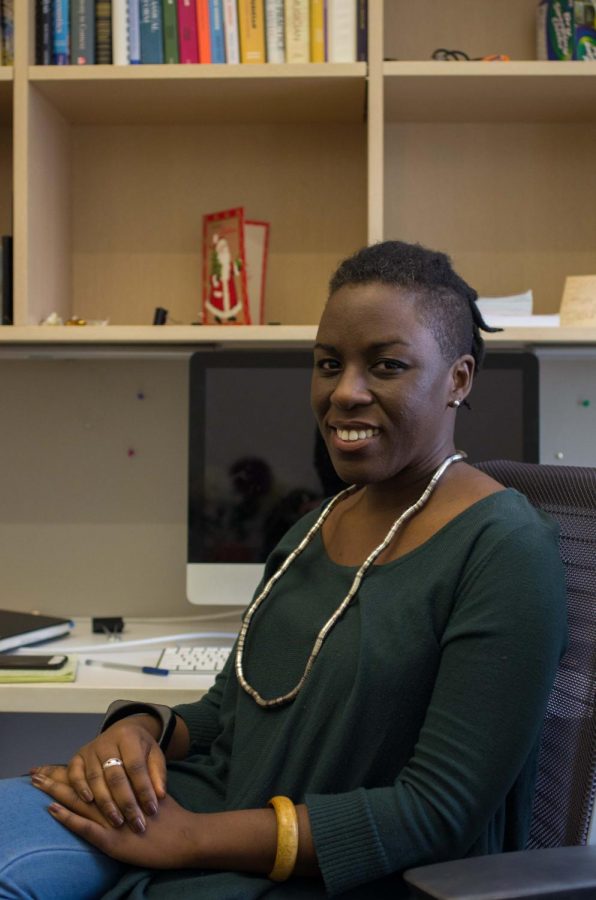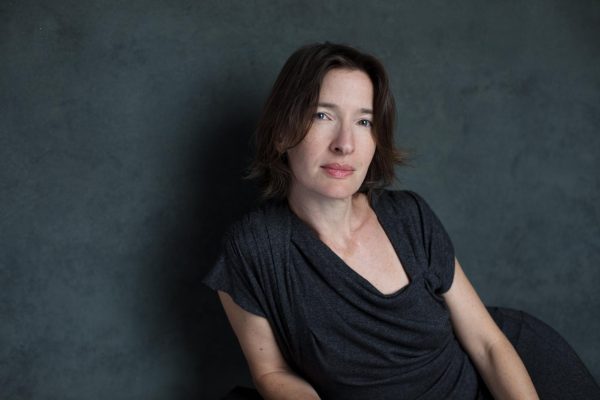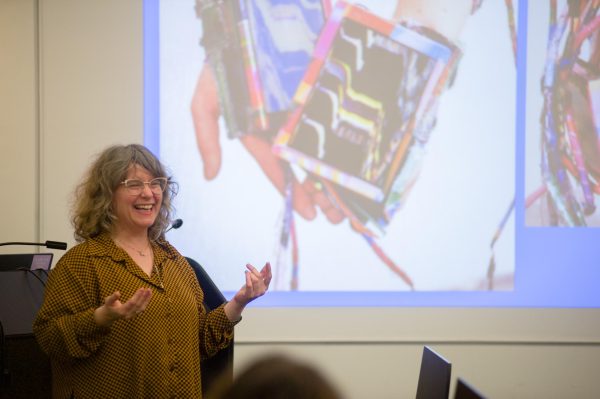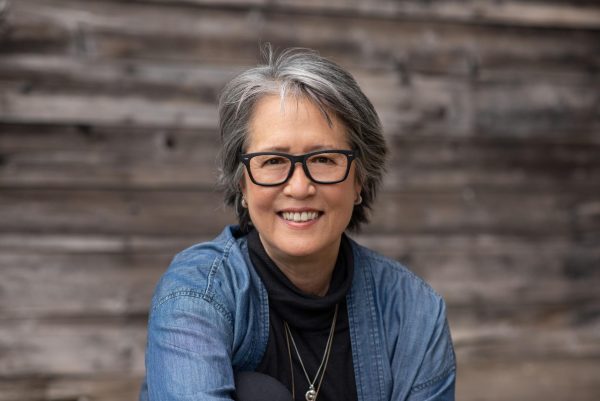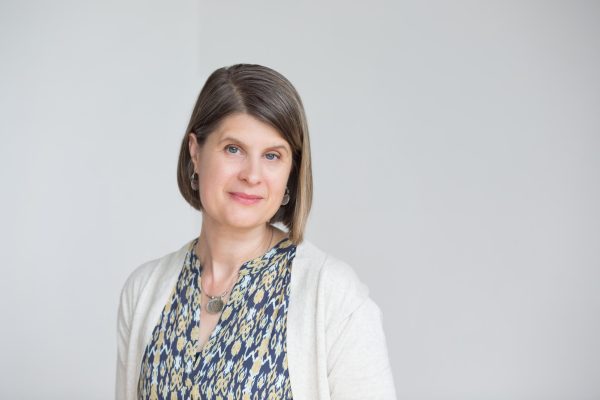Fredara Hadley, Assistant Professor of Ethnomusicology
Photo by Hugh Newcomb, Photo Editor
Visiting Assistant Professor of Ethnomusicology Fredara Hadley
Fredara Hadley is a Visiting Assistant Professor of Ethnomusicology at Oberlin. She received her Masters degree in Arts from Clark Atlanta University and is currently pursuing her Ph.D. at Indiana University. Professor Hadley is involved with the Society of Ethnomusicology, the International Association for the Study of Popular Music, and Experience Music Project’s Popular Music Conference. She is also the founder of Jooksi, a company that provides music education and music-based walking tours of New York City. Last Tuesday she gave a presentation on “The Black History of Oberlin Conservatory” in honor of Black History Month.
This interview has been edited for length and clarity.
What do you want people to take away from your talk?
I was thinking a lot about my students — the students who are in my class now, presently, and students who have been in my classes. I say this to them all the time: they have a tremendous amount of power. I wanted them to be inspired by what [other] students were able to accomplish while they were here; I wanted them to be inspired artistically; I wanted them to be inspired [and know] that they can do a lot socially. Dean [Chris] Jenkins told them last week that student activism helped to bring him here. Student activism helped to bring me here. Students have voices that I respect, and I think that they should be reminded and inspired by what people do when they leave here. And even in a contemporary moment we talked about composers like the brilliant Courtney Bryan [OC ’04] who graduated from the composition department here, Rhiannon Giddens [OC ’00] who just got a Macarthur Genius Award … Theo Croker [OC ’07], Sullivan Fortner [OC ’08], who graduated from here as well. And so [I’m working on] really helping them connect the dots regardless of who they are, what their race, gender identity may be. Be inspired by all of these folks who’ve come through the same experience that you’re coming through, and use your voice in all the ways that you can use your voice. By being an Obie … you are a part of a legacy, a community of people. Be proud of that, and hold it and yourself accountable.
What do you think is the relevance of ethnomusicology in the modern world ?
I think [of] ethnomusicology as [a] discipline that is built around ethnographic methods and actually talking to people and observing musical performances. … It’s a great opportunity to get out of the building, get out of your head, get beyond what you think you know about the world, what you think you know about a group of people, no matter how similar or dissimilar they may be. I really thought a lot about that in a course I taught last semester called Black Music in the Hour of Chaos, [and] one of the themes we were really trying to work through was gentrification. I had students talk about the Black community that exists in the closest proximity of where they’re from, and also talk about the music associated with that community, if they could identify some kind of musical representation of that community. I thought it was a revealing exercise [for the] field of ethnomusicology. This academic discipline could be used to help students grapple with and address personal experiences with these communities, … through musical associations and to really reconsider what they thought they knew about these communities or for students to … reframe the narrative about their neighborhoods. A year ago I wouldn’t have thought that something like ethnomusicology would’ve been useful in that way. I think we’re fortunate that Oberlin has ethnomusicologists who are here. Professors such as Professor Fraser are really committed to ideas of community engagement … and thinking about how do we make this as practical and as close to students in their experiences as possible. Music is usually something everyone has experience with, and you can get everyone to come to the table using music.
What is the most exciting part of the research you do?
The exciting part always is finding something I had no idea existed. When I was in the archives last week, I really felt like I was on a treasure hunt. Everything I found out about Shirley Graham DuBois was amazing but also, [the archives] had lots of people’s handwritten things. I am happy to go off and dig. If I could just research all day, I would. I love it. It just so happened a colleague of mine, Professor Tamika Nunley from [the] History [department], was in the archive at the same time. I was knee-deep in Shirley stuff. She said she, too, was interested in Shirley Graham DuBois, and so we’re kicking around possibilities, because it became important to both of us to bring her work back … to us here at Oberlin in some kind of meaningful and powerful way. Shirley Graham DuBois might be a really interesting opportunity to branch the divide between the College and the Conservatory. Here you have this really [unique] figure who created a unifying piece of work.
How does the music you study intersect with the modern political culture?
This is where I have to say I’m grateful to teach at a place like Oberlin where we have a bit more latitude … to deal directly with what’s happening in the world. It’s important to me to never proselytize or put my political views on students or things of that nature, but we can talk about the 2016 elections or Black Lives Matter, … and if I’m going to be honest and have integrity when I’m … talking about music and race then I feel obligated to talk about these issues. A lot of the ways by which we deal with it is by looking [at] and thinking about and listening to musical responses that are happening in the world. If I want to talk about Black Lives Matter I will pull pieces like Kendrick Scott’s “Philando,” … Ambrose Akinmusire’s “Rollcall for Those Absent” … [and] really talk about how Black music has really been in response to what has happened in the world. [Black music is] also the practice of joy despite what has happened in the world. We talk about that in the class, listen to albums by Solange, Beyoncé, Jay Z, Marvin Gaye, really peeling back the layers, doing deep listening of these works. Studying music, something that brings people to the table, can be a powerful way to gauge people’s commentary about what’s happening in the world, good or bad.
The Conservatory actually had an activism teach-in, and I thought this was one of the most powerful days I’ve had here at work. It was full faculty and deans there. A few of us presented, and … after the lecture some of the students said, “I don’t understand what I should be doing now. Does the world still need me to be in a practice room eight hours a day when it feels like everything’s going crazy in the world itself?” So we talk about all the ways in which music is even more important in those moments. It can be music of protest, which is really important. It can be music of memory, like this piece “In Memoriam: [The Colored soldiers who died for democracy.]” It can also just be catharsis — music that is beautiful and helps us forget for one minute if things are terrible.
Can you talk a little about Jooksi and why you founded it?
As a musicologist, I had long been studying more than a specific genre, the narrative, the arc of the story of Black music in America. I was struck by [how] you can walk around [New York] City and go to a place that is connected to almost every genre that one could teach about in terms of Black music. I wanted a way to extend that conversation beyond what I do in academia. I wanted to find ways to make that a wider audience, … so I started Jooksi. It started out as a podcast … and that was our opportunity to play lots of music that we felt deserves to be heard both from the past and the present and to tell stories about the music, the people who made the music. and about us that we felt weren’t being told enough. But I liked talking to people, so I got my sight-seeing license in New York, and I would do walking tours of Harlem and Brooklyn and lower Manhattan talking about all these genres. I tell people I’m a one-trick pony — the only thing I can really do is talk about Black music — and so it’s about trying to figure out what are all the ways I can deliver that message. And it’s also about community engagement; it’s important to me that the knowledge I’ve been fortunate enough to earn is available not just to my students, but … to the community from which I gained the knowledge in the first place.
11


